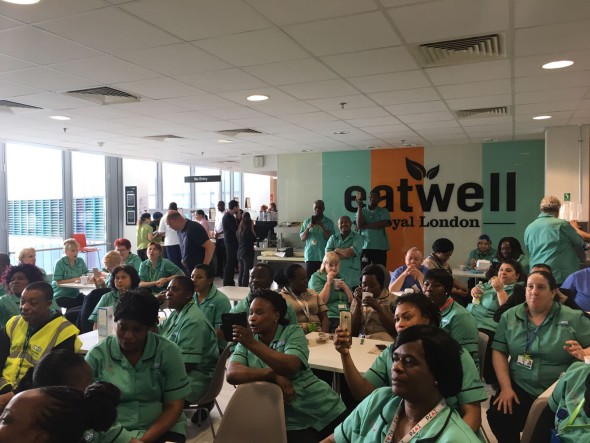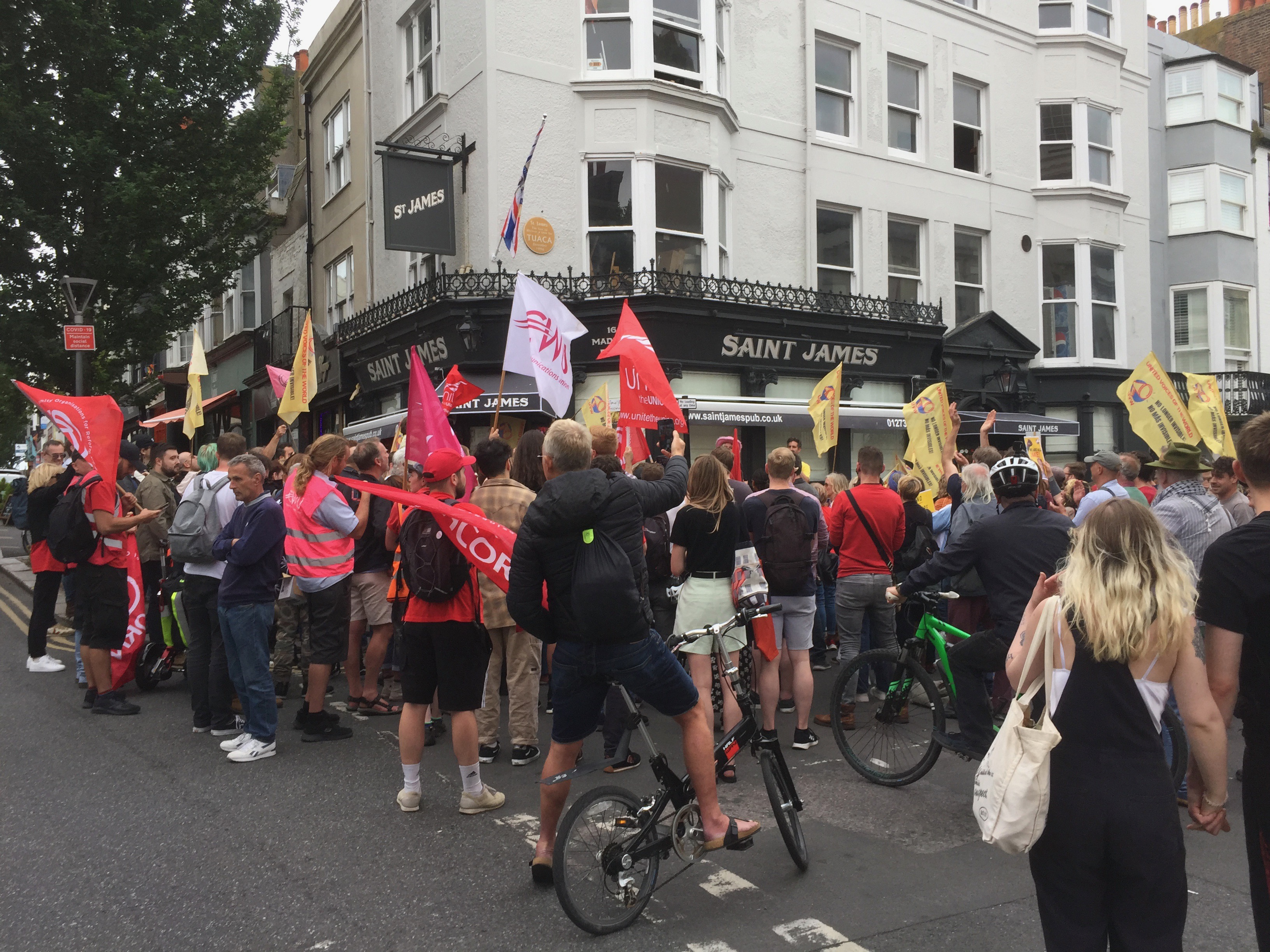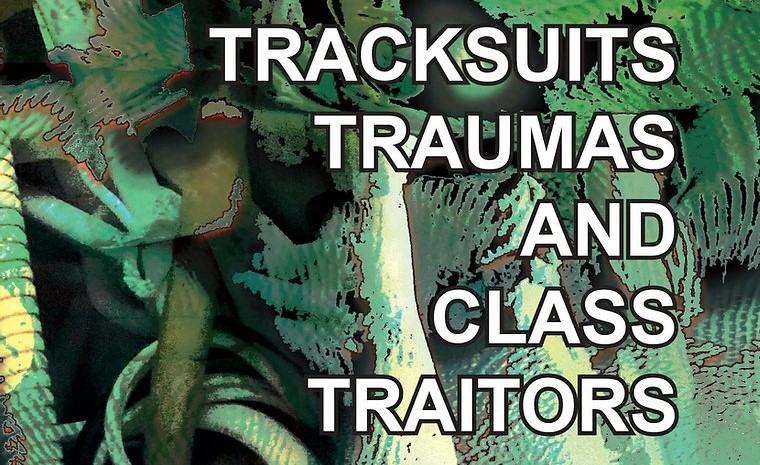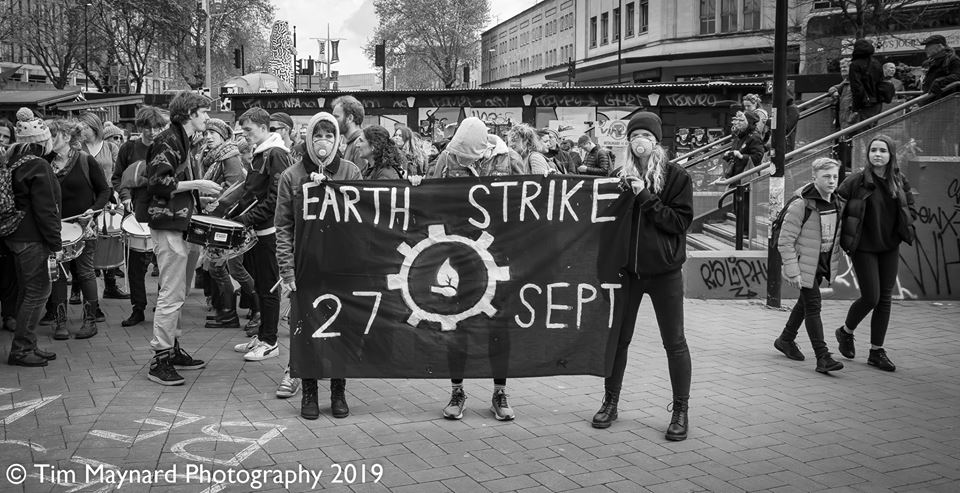Originally published by Novara Media.
Rhian Smith, Plan C London.
The biggest hospital in Europe. An NHS trust straddling one of the starkest economic divides in the country, from London’s least employed borough to the gleaming towers of the City. An ex-CEO and chief nursing officer who resigned just two years ago after the trust reported a £93m deficit. This is context in which the board of Barts Health NHS Trust awarded a £600m ten-year cleaning, portering and security contract to Serco last year. But they didn’t quite anticipate the fight staff would put up defending their pay and working conditions.
Serco, a £3bn multinational which makes its money from public sector contracts, has a reputation for mismanagement. In 2015, it repeatedly failed to pay teachers and public sector workers from a Lincolnshire County Council payroll it was supposed to be managing, and the following year it was exposed for allowing managers to run a fight club of inmates at New Zealand’s Mount Eden Prison. For Serco, Barts was a flagship opportunity – if it could crack it here, even as a loss leader, then there were hundreds of smaller NHS sites and services it could bid for. But the final deal still left little room for profit unless it took radical action against its new employees.
Serco’s first act at the Royal London Hospital was to take paid breaks away from cleaners. “They sent us a letter which said this change had immediate effect, so we took immediate action”, one cleaner recounted to me. 140 of them, of 45 nationalities and primarily led by migrant women of colour, gathered in the canteen and told their managers they wouldn’t restart work until they had been given back their breaks. After two consecutive days of stoppages, Serco restored their paid breaks.
Staff have seen a dramatic increase in their workloads since then. One cleaner told me he has to clean 104 doors a day – just one part of his increasing workload due to Serco leaving posts empty as staff quit. Cleaners at the Royal London Hospital, Mile End and Whipps Cross have reported that essential cleaning fluids are unavailable or have been diluted. These cleaners are having to choose to either face disciplinary action or cut corners – which could pose a serious threat to patient safety in hospitals that frequently manage cases with MRSA and C. Diff. Serco is attempting to squeeze profit from the contract by cutting their resources, but the work simply cannot be done well at the rate that is needed. Staff report a climate of bullying, intimidation and fear which is leading to high levels of stress and absence, with many cleaners already working two or three jobs to stay afloat. Now, seven months into the contract, Serco’s management team are yet to introduce themselves to staff, who have no idea who to report to when there are problems with facilities, for a serious incident or even about their own ill health.
Since 2010, all NHS staff have had their pay kept below inflation, with 1% annual pay awards. Since taking on the contract, Serco have refused to award even this to the staff at Barts Health. Emboldened by their successful defence of their paid breaks, and free of the 1% pay restraint imposed on those directly employed by the NHS, the cleaners and their Unite team put in a pay claim for 30p an hour raise – in line with inflation and cost of living increases in London. Unite estimate it would cost £800k to pay the more than a thousand staff members on the contract reasonably – a fraction of the £2.2m earnt last year by Serco’s CEO and grandson of Winston Churchill Rupert Soames.
Ballots went out to cleaners and porters this week, and the Unite organisers are hopeful. Inspired by the work of American organiser Jane McAlevey, who led the hugely successful statewide 2006 hospital strike in notoriously union-hostile Nevada, the Unite organisers worked with the cleaners and porters to develop a workers committee at each site. “It’s not worth building unless it’s sustainable”, one of them told me. “The workers are doing all of the canvassing for themselves – they’re leading this campaign, and it’s our job to help them to be as autonomous as possible.”
Unite has recruited 1,100 new members at the trust since March, and they’re active and engaged. “This is the most exciting campaign that I’ve worked on, and it’s near universally woman led. If we can win here then not only will it put off Serco and other outsourcers from taking on contracts like this, but it will draw a line in the sand for all NHS workers – showing them what they can do with proper organisation and militancy.” The staff committee agreed to start with a one day strike, with a commitment to escalate to an indefinite strike within a fortnight if Serco do not respond to their demands.
Serco are unlikely to improve their practices without serious pressure, and the workers seem committed to their strategy, so it may fall to Barts Health’s board to intervene by both enforcing the terms of their contract and the working conditions of their staff. At the Royal London Hospital alone they’re locked into spending £2.4m a week on interest payments for the biggest hospital Private Finance Initiative (PFI) in the country, whilst taking a 17% budget cut since 2010. Cuts from the Coalition government and the shackles of PFI introduced under New Labour will put them in a bind – but it’s one they will have to break out of if they want their staff treated fairly and their hospitals clean.
If you want to support the cleaners in their action, please contact their Unite Branch Secretary at len.hockey@unitetheunion.org.





